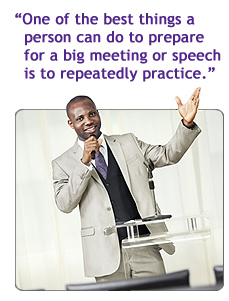 Making an important presentation? Or meeting with a senior executive for the first time? Maybe you’re set to discuss a promotion with your manager. These are all work-related activities you have no reason to fear or dread. So why do you feel jittery and have those proverbial "butterflies" in your stomach?
The explanation is what doctors call the "fight or flight" response.
You don’t have to necessarily be a person prone to panic attacks and chronic anxiety to feel the symptoms of this physiological reality on occasion. Faced with certain situations, your body reacts by releasing stress hormones and pumping up your pulse rate. Your palms can feel sweaty and your stomach may feel upset, too.
Unfortunately, the adrenaline rush behind these harmless but annoying feelings can also interfere with your ability to think clearly and express what’s on your mind. But here’s good news: there are tried-and-true, self-help strategies to prevent and soothe the fight or flight mode.
 Understanding those jittery feelingsWhy do our bodies sometimes overreact and make us want to literally fight or run away, even though we’re in no physical danger? It turns out that the fight or flight response is linked to perceived danger and the potential for physical or psychological loss. Even if you’re simply making a presentation in front of friendly co-workers, somewhere in the back of your mind you may be thinking you’ll "lose face" if you forget some points and that registers in the brain as "fear."
"The brain does not differentiate between physical or psychological causes of ‘fear’ as a raw emotion. It only knows that there is fear. In response, the brain releases a physiologic cascade of biochemical reactions that is not dependent on the cause of the fear," Elizabeth G. NeSmith, PhD, MSN, RN , an assistant professor at Georgia Health Sciences University’s College of Nursing, tells Synergy.
"For example, the physiologic stress reaction that occurs when someone learns that a loved one has been in an accident is the same as if the person who was informed was in actual physical danger. In this case, the fear occurs because of perceived loss of the loved one, and not fear associated with perceived physical loss," Dr. NeSmith says.
For some people just anticipating a possible problem – like flubbing a speech – can cause the brain to send out fear signals, producing the physiological reactions most of us describe as feeling nervous.
 How to downshift out of fight of flight modeMost therapies aimed at reducing fear and the associated physiologic stress focus on repeated, "safe" exposures to the fear. For example, if a therapist encounters a person who is very anxious around spiders, the therapist may repeatedly expose the person to images of spiders. Following these repeated exposures, the person, seeing that no actual harm occurred, eventually becomes desensitized to the offending object and feels less fear.
The same desensitization principle applies to learning to calm yourself down so you won’t feel "jittery" before a work-related event or presentation.
"One of the best things a person can do to prepare for a big meeting or speech is to repeatedly practice or role play in a simulated environment that is as close to the real thing as possible. Many people who were once fearful in these situations tell me that they practice their presentation in the room they are scheduled to speak in, or role play with a friend who plays the part of the other individual," Dr. NeSmith says.
"During the practice session, they imagine the audience in front of them as they talk. They do this as many times as necessary until they feel the anxiety subside. I have even done this in hotel conference rooms the night before a big presentation and found it very helpful!"
Stimulants and medications: helpful or hurtful?You have a talk to give or a meeting to attend where you’re presenting an important report. It’s slated for the early morning and you want to be wide awake and alert – so downing a couple of cups of java is just what you need, right?
Wrong, if you are prone to feeling nervous.
"In the same way a golfer knows that his adrenaline level is high in a big tournament and acts to counterbalance this effect by not swinging as hard at the ball, a speaker should beware of the additive effects of caffeine and other stimulants in the presence of stress hormones. Stimulants can make the person feel more anxious and actually increase the negative effects of the fight or flight response," Dr. NeSmith tells Synergy.
What about soothing your nervousness with anti-anxiety prescription drugs? Although some people with extreme stage fright may find medication helpful when used under their doctor’s supervision, Dr. NeSmith doesn’t recommend it.
The reason? "The effects of medications cannot be confined to only one target symptom, i.e. the nervousness we feel before a big presentation. Medications affect the body as a whole and can have negative effects on other systems that we didn't expect or want," she answers. "These effects could have unintended and perhaps dangerous consequences. In my opinion, the safest and most effective way to reduce stress and anxiety in these situations is repeated exposure and the use of relaxation techniques."
Dr. NeSmith points out that researchers have found that relaxation techniques (i.e. yoga, deep breathing, visualization, and meditation) can reverse the biochemical cascade that increases anxiety and change it to a biochemical cascade that reduces anxiety.
"Visual imagery and music are very helpful techniques in this regard. That’s why you often see high-level athletes and entertainers with their earphones and iPods prior to a big performance," Dr. NeSmith adds.
Yes, even superstars of sports and show biz can get the "jitters" – and they often calm their fight or flight response with the same techniques you can use before a meeting or talk.
"Observed behavior from these individuals that we may perceive as ‘getting in the zone’ is often athletes and performers imagining themselves in a relaxing place or being ultimately successful in their performance," Dr. NeSmith concludes.
|